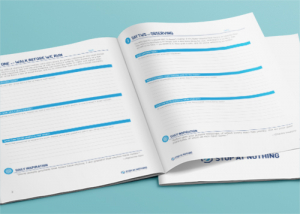By Jon Patton – February 2021
Most leaders get where they are because of their strong focus on results and outcomes. But during difficult times, it’s important that we make sure the people on our teams and in our lives realize they matter, and we care. Here are 5 things you can work on to achieve this, starting today.

I remember coming across Aesop’s fable about the goose and the golden egg many years ago in Stephen Covey’s seminal book “The 7 Habits of Highly Effective People.”
Covey relayed the story of a poor farmer discovering a glittering gold egg in his pet goose’s nest. The egg is pure gold, and day after day, he rushes to the nest to find another golden egg. Eventually, in his impatience, he kills the goose to get all the eggs out at once. There are now no gold eggs and no way to get any more. Covey uses this to illustrate that actual effectiveness strikes a balance between the end result (the golden eggs) and the producer of the end result (the goose).
In most of the organizations in which we work, leaders tilt heavily in the direction of outcomes. There are personality tests that indicate where people are pointed. In most cases, leadership groups lean heavily in this direction (80% plus), myself included!
Now, these leaders mostly care tremendously about people. But they can have a behavioral blind spot, which may lead them to over-index their actions toward outcomes, giving people the impression of an uncaring leader or colleague. As we all know, this can have long-term negative impacts on morale, engagement, productivity, attrition, etc. This can also translate into our home life, where for example, our children feel what they achieve (grades, sporting achievements, etc.) takes precedence over feeling loved and cared for.
Armed with an awareness of this blind spot, people can make behavioral changes. A client once shared that he was tough on his daughter, he wanted her to do well in school, and most mornings started with poorly chosen words and hurt feelings as she rushed off to school in a state of disorganization. One day, to prioritize relationship over results, he stood at the bottom of the stairs and was greeted by a “here we go again” look. He simply said “I wanted to give you a hug before you went to school.” As an incredulous look appeared on her face, he added “I’d love for us to have breakfast tomorrow if you could be ready a little earlier.” To his surprise, the next morning his daughter was up early, fully prepared for school, and they eat breakfast together.
The balance between results and care for people has never been more important as we negotiate the challenges of the moment, with the virtual world blurring the lines between work and home, school and family and mental health being challenged by less social interaction, political acrimony, concern for aging parents, all against the backdrop of a global pandemic.
Here are some of the actions my clients have taken to address the needs of people in their lives:
- Talk about what matters. Encourage conversations with leaders about how they are doing and feeling in life. In our last blog, my colleague Ted Powell provided guidance and a worksheet to help frame such a discussion. A client who wanted to be more empathic and caring received very positive feedback on this approach.
- Express your thankfulness. Showing appreciation can be a real blind spot for results dominated leaders, with a tendency to look for what’s wrong, overlooking successes and moving straight to what’s next, or looking at appreciation as a method to drive results, which can come off as being insincere and manipulative. If you’d like to explore this please, please refer to my colleague Kevin Haas’s blog on Appreciation.
- Connect with sincerity. As the country is going through social unrest, we have seen leaders’ responses run the gamut from ignoring it to openly encouraging dialogue. As a result, people have either felt isolated or that their leaders and companies were supportive during critical times. One leader shared that just before the Presidential inauguration, she sent a note to her team, acknowledging that this might be difficult for people and encouraged them to reach out and chat. Although only a few took her up on her offer, many more expressed their appreciation for their caring.
- Commit to conversations (relationships). If there are people in your life that are important to you, make a commitment to call them more regularly and not as chore-something to check off the list, but to have a good quality conversation where they are clear of your positive feelings towards them. My Mum is in her mid 80’s and confined to her house as the UK has gone into a very strict lockdown. I used to talk to my Mum once a week on a Sunday. We now Facetime nearly every day, and I feel we have never been closer.
- Reflect with gratitude. I like to recommend the practice of gratitude as an inside-out method of developing the feeling of caring and empathy. The process is simple and is best done first thing in the day or last thing at night. After closing your eyes and clearing your mind as best you can, reflect on the items in your life that you are grateful for, your house, a cup of coffee, and the people in your life. Concentrate not just on the mental pictures but recognize how this makes you feel. Taking these feelings of caring, gratitude, and appreciation into your life will prepare you to be a leader of our times.
While results and outcomes are undoubtedly important, we must keep in mind those who get us to those goals, and those who support us. Our actions and reactions shape who we appear to be, regardless of who we think we are. When you can show others that you can listen and understand, they won’t have to guess about your true intentions.

